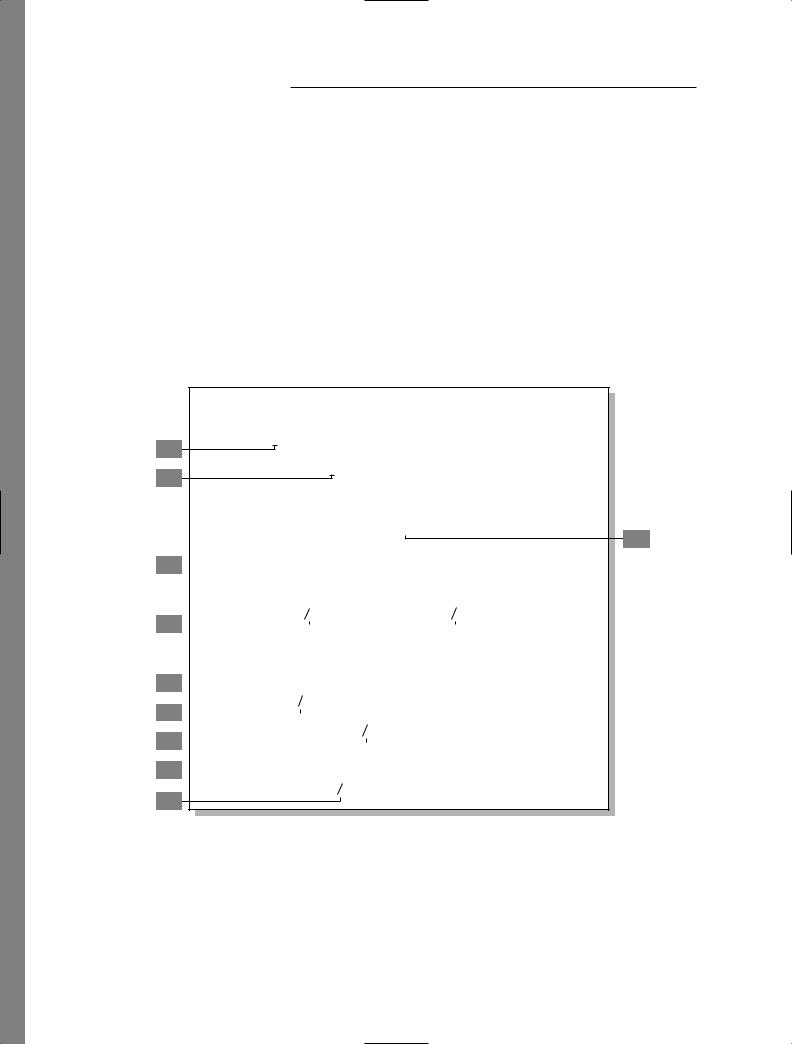
English Grammar Workbook for "dummies" - Geraldine Woods
.pdf
94 Part II: Mastering Mechanics
Separate ownership: If two or more people own things separately, everyone gets an apostrophe and an s (Abe’s and Mary’s pajamas; George’s, Jeb’s, and Barbara’s shoes).
Hyphenated owner: If the word you’re working with is hyphenated, just attach the apostrophe and s to the end (mother-in-law’s office). For plurals ending in s, attach the apostrophe only (three secretary-treasurers’ accounts).
Time and money: Okay, Father Time and Mr. Dollar Bill don’t own anything. Nevertheless, time and money may be possessive in expressions such as next week’s test, two hours’ homework, a day’s pay, and so forth. Follow the rules for singular and plural owners, as explained at the beginning of this bulleted list.
Easy stuff, right? See whether you can apply your knowledge. Turn the underlined word (or words) into the possessive form. Write your answers in the blanks provided.
Q. The style of this year muscle car is Jill favorite.
A. year’s, Jill’s. Two singular owners. Jill is the traditional owner — a person, but the time expression also takes an apostrophe.
26.Carol classic car is entered in tonight show. ______________________________
27.She invested three months work in restoring the finish. _______________
28.Carol will get by with a little help from her friends; Jess and Marty tires, which they purchased a few years ago with their first allowance, will be installed on her car.
______________________________
29.The boys allowance, by the way, is far too generous, despite their sister-in-law objections.
______________________________
30.Jill weekly paycheck is actually smaller than the brothers daily income.
______________________________
31.Annoying as they are, the brothers donate a day pay from time to time to underfunded causes such as the Women Committee to Protect the Environment.
______________________________
32.Carol couldn’t care less about the environment; the car gas mileage is ridiculously low.
_______________
33.She cares about the car, however. She borrowed Jess and Marty toothbrushes to clean the dashboard. ______________________________
34.Now she needs her helpers maximum support as the final judging nears. _______________
35.She knows that the judge decision will be final, but just in case she has volunteered two thousand dollars worth of free gasoline to his favorite charity.
______________________________
36.Carol success is unlikely, because the court judgments can’t be influenced by anything but the law. ______________________________
37.Last week, for example, the judge ruled in favor of a developer, despite the mother-in-law plea for a different verdict. _______________
38.Ten hours begging did no good at all. _______________
39.Tomorrow the judge will rule on the car show effect on the native animals habitat.
______________________________

Chapter 7: One Small Mark, a Whole New Meaning: Apostrophes 95
40.The geese ecosystem is particularly sensitive to automotive exhaust.
______________________________
41.The fish ecosystem is easily damaged as well. _______________
42.In September, someone poured two weeks worth of used french-fry oil into a lake.
_______________
43.All the marine animals oxygen was trapped in the oil. _______________
44.Ten months cleaning was needed to restore the water to purity. _______________
45.The restaurant that dumped the oil accepted responsibility for the cook actions.
_______________
Calling All Overachievers: Extra Practice with Apostrophes
Marty’s to-do list, shown in Figure 7-1, needs some serious editing. Check the apostrophe situation. You need to find nine spots to insert and six spots to delete an apostrophe.
Figure 7-1:
Mock to-do list, full of apostrophe mistakes.
Things to Do This Week
A.Call Johns doctor and arrange for a release of annual medical report.
B.Check on last springs blood pressure numbers to see whether they need to be changed.
C.Ask John about his rodent problem’s.
D.Find out why networks cant broadcast Tuesdays speech live, as John needs prime-time publicity.
E.Ask whether his’ fondness for long speeches’ is a problem.
F.Send big present to network president and remind him that you are both Yale 06.
G.Order bouquet’s for secretary and National Secretaries Week card.
H.Rewrite speech on cat litter’ to reflect sister-in-laws ideas.
I.Tell opposing managers assistant that “you guys wouldnt stand a chance” in the old day’s.

96 Part II: Mastering Mechanics
Answers to Apostrophe Problems
a aren’t. The contraction drops the letter o and substitutes an apostrophe.
bI’m, you’ll. In the first contraction, the apostrophe replaces the letter a. In the second, it replaces two letters, w and i.
cwon’t. This contraction is irregular because you can’t make an apostrophe-letter swap. Illogical though it may seem, won’t is the contraction of will not.
dDon’t. Drop the space between the two words, eliminate the o, and insert an apostrophe to create don’t.
eyou’re, don’t. The first contraction sounds exactly like the possessive pronoun your. Don’t confuse the two.
fwould’ve, wouldn’t. Take care with the first contraction; many people mistakenly re-expand the contraction would’ve to would of (instead of the correct expansion, would have). The second contraction, wouldn’t, substitutes an apostrophe for the letter o.
gcan’t. Did you know that cannot is written as one word? The contraction also is one word, with an apostrophe knocking out an n and an o.
h he’s. The same contraction works for he is (as in this sentence) and he has. i I’d. You’re dropping the letters woul.
j you’d. The same contraction works for you would (as in this sentence) and you had. k She’s. The apostrophe replaces the letter i.
lcould’ve. Be careful in re-expanding this contraction. A common mistake is to write could of, an expression that’s a total no-no.
m’99. A date may be shortened, especially if you’re out with Adam. Just be sure that the context of the sentence doesn’t lead the reader to imagine a different century (2099, perhaps). This one is fairly clear, given that we’re nowhere near 2099, and 1899 is probably not the intended meaning.
n’06. Not much chance of the reader misunderstanding which numbers are missing here (unless he or she is really old)!
o we’re, we’ll. The apostrophes replace the letter a and wi.
p’12, they’re. In the first part of this sentence, the apostrophe replaces two numerals. It’s okay to drop numerals as long as the reader is likely to understand what’s been left out. In the second part of this sentence, the apostrophe replaces the letter a.
q we’re. The apostrophe replaces the letter a in this contraction of we are. r who’s. The apostrophe replaces the letter i in this one.
s He’s. Only one letter is replaced here (i ), but in this hurried world, every letter counts. t We’ll. This one is a bargain. Drop two letters (wi ) and plop in an apostrophe instead.

Chapter 7: One Small Mark, a Whole New Meaning: Apostrophes 97
u He’d. The apostrophe is a real space saver in this contraction; it replaces woul.
v should’ve. If you take out the ha, you can insert an apostrophe and create a contraction.
wcouldn’t. I’m not sure why anyone cares about gossip, but I’m sure that the contraction has an apostrophe in place of the letter o.
x isn’t. Drop the o and replace it with an apostrophe.
ycan’t, doesn’t. Two for the price of one here: In the first blank, you substitute an apostrophe for the letters no. In the second, just the o drops out in favor of the apostrophe.
ACarol’s, tonight’s. Carol owns the car, so you just need to attach an apostrophe and an s to a singular form to create a singular possessive. The second answer illustrates a time/money possessive expression.
Bthree months’. The value of time and money can be expressed with a possessive form. Because you’re talking about months, a plural, the apostrophe goes after the s.
CJess and Marty’s. The sentence tells you that the boys own the tires together, so only one apostrophe is needed. It’s placed after the last owner’s name. The possessive pronoun her, like all possessive pronouns, has no apostrophe.
Dboys’, sister-in-law’s. The plural possessive just tacks an apostrophe onto the s, in regular, end-in-s plurals. Hyphenated forms are easy too; just attach the apostrophe and an s to the end.
EJill’s, brothers’. The first form is singular, so you add an apostrophe and an s. The second form is a regular plural, so you just add the apostrophe.
Fa day’s, Women’s. The first form falls into the time/money category, and because day is singular, you add an apostrophe and an s. The second is an irregular plural (not ending in s), so you tack on an apostrophe and an s.
G car’s. A singular possessive form calls for an apostrophe and an s.
HJess’s and Marty’s. Okay, the brothers are close, but they draw the line at shared toothbrushes. Each owns a separate brush, so each name needs an apostrophe.
If a word ends in s (Jess, for example), adding an apostrophe and another s creates a spit factor: People tend to spray saliva all over when saying the word. To avoid this unsanitary problem, some writers add just the apostrophe (Jess’ ), even though technically they’ve neglected the extra s. Grammarians generally allow this practice, perhaps because they too dislike being spit upon. In all but the strictest situations, either form is correct.
I helpers’. To create a plural possessive of a word ending in s, just attach an apostrophe.
Jjudge’s, two thousand dollars’. The first answer is a simple, singular possessive, so an apostrophe and an s do the trick. The second is a time/money possessive, and two thousand dollars is plural, so just an apostrophe is needed.
KCarol’s, court’s. Two singular words, so only an apostrophe and the letter s are needed to make each possessive.
L mother-in-law’s. The apostrophe and the letter s follow the last word of the hyphenated term.
MTen hours’. The apostrophe creates an expression meaning ten hours of begging. Because hours is plural, only an apostrophe is added.

98 Part II: Mastering Mechanics
N car show’s, animals’. The first is a singular possessive, and the second is plural.
Ogeese’s. The word geese is irregular. In an irregular plural, an apostrophe and the letter s are added.
Pfish’s. The word fish is irregular (and unusual); the singular and plural form are the same. To create a possessive, add an apostrophe and the letter s.
Q weeks’. To create a plural possessive, add an apostrophe after the letter s.
R animals’. This regular plural ends with the letter s. To show possession, add an apostrophe.
S months’. This regular plural needs only an apostrophe after the s to become possessive.
Tcook’s. When one cook becomes possessive, he hogs all the desserts. Oops. That’s life, not grammar. Just add an apostrophe and the letter s.
46
47
49
51
53
54
56
58
60
Things to Do This Week
A.Call John’s doctor and arrange for a release of annual medical report.
B.Check on last spring’s blood pressure numbers to see whether they
need to be changed.
C.Ask John about his rodent problem’s.
48
D. Find out why networks can’t broadcast Tuesday’s speech live, as John |
|
|
|||||||||||||||||||||
|
|
|
|
|
|
|
|
|
|
|
|
|
|
|
|
|
|
|
|
|
|
50 |
|
|
|
|
|
|
|
|
|
|
|
|
|
|
|
|
|
|
|
|
|
|
|
||
|
|
|
|
|
|
|
|
|
|
|
|
|
|
|
|
|
|
|
|
|
|
||
needs prime-time publicity. |
|
||||||||||||||||||||||
E. Ask whether his’ fondness for long speeches’ is a problem. |
|
||||||||||||||||||||||
52 |
|||||||||||||||||||||||
|
|
|
|
|
|
|
|
|
|
|
|
|
|
|
|
|
|
|
|
|
|
||
F. Send big present to network president and remind him that you are |
|||||||||||||||||||||||
|
|||||||||||||||||||||||
both Yale ’06. |
|
||||||||||||||||||||||
|
|
|
|
|
|
|
|
|
|
|
|
|
|
|
|
|
|
|
|
|
|
|
|
G. Order bouquet’s for secretary and National Secretaries’ Week card. |
|
|
|||||||||||||||||||||
|
|
|
|
|
|
|
|
|
|
|
|
|
|
|
|
|
|
|
|
|
|
55 |
|
|
|
|
|
|
|
|
|
|
|
|
|
|
|
|
|
|
|
|
|
|
|
||
H. Rewrite speech on cat litter’ to reflect sister-in-law’s ideas. |
|
||||||||||||||||||||||
|
|
|
|
|
|
|
|
|
|
|
|
|
|
|
|
|
|
|
|
|
|
57 |
|
I. Tell opposing manager’s assistant that “you guys wouldn’t stand a |
|
||||||||||||||||||||||
|
|
||||||||||||||||||||||
|
59 |
||||||||||||||||||||||
|
|
|
|
|
|
|
|
|
|
|
|
|
|
|
|
|
|
|
|
|
|
||
|
|
|
|
|
|
|
|
|
|
|
|
|
|
|
|
|
|
|
|
|
|
||
chance” in the old day’s. |
|
||||||||||||||||||||||
UThe doctor belongs to John (in a manner of speaking), so the apostrophe is needed to show possession.
V
W
This time expression needs an apostrophe and an s.
A simple plural (not possessive, not a numeral, and so on) takes no apostrophe.

Chapter 7: One Small Mark, a Whole New Meaning: Apostrophes 99
X In this contraction, the apostrophe replaces the letters n and o.
Y Time expressions sometimes use apostrophes, as in Tuesday’s. z Possessive pronouns don’t have apostrophes.
Z A plural takes no apostrophe.
1 |
Missing numerals (in this case, 20) are replaced by an apostrophe. |
2 |
A simple plural doesn’t take an apostrophe. |
3This plural possessive form — the secretaries own the week, symbolically — adds an apostrophe after the s.
4 |
In this sentence litter isn’t possessive and doesn’t need an apostrophe. |
5 |
A hyphenated singular form takes an apostrophe and an s to become possessive. |
6 |
A singular possessive is created by adding an apostrophe and an s. |
7 |
In this contraction, the missing letter o is replaced by an apostrophe. |
8 |
Days is just plural, not possessive, so it doesn’t take an apostrophe. |

100 Part II: Mastering Mechanics

Chapter 8
“Let Me Speak!“ Quotation Marks
In This Chapter
Punctuating directly quoted material
Placing other punctuation marks in sentences with quotations
Dealing with speaker tags and embedded or interrupted quotations
Punctuating titles of literary and media works
When I first started teaching, I used to curve and wiggle two fingers of each hand whenever I was quoting someone else’s words. I assumed the students knew that my
fingers represented the two little lines that precede and follow a direct quotation (“ ”). Big mistake. It was June before I discovered that they had interpreted my wiggles as a strange form of wave. Sadly, this error was only one of many they made with quotation marks.
Quotation marks may puzzle you, too, because they’re subject to so many rules, most of which come from custom and tradition rather than logic. But if you’re willing to put in a little effort, you can crack the code and ace this important punctuation mark.
Quotation marks have a few important jobs:
Directly quoted material: Quotation marks surround words drawn from another person’s speech or writing. In fiction, quotation marks indicate dialogue: “I would love to receive a single rose,” sighed Sandy. Quotation marks don’t belong in a sentence that summarizes speech, such as He said that he had caught a cold.
Titles: Quotation marks surround the titles of certain types of literary or other artworks: Emily’s first poem, “Ode on a Grecian Olive,” was printed in the school magazine.
Distancing: Quotation marks sometimes are used to indicate slang or to tell the reader that the writer doesn’t agree with the words inside the quotation marks: I don’t always appreciate Emily’s “art.”
In this chapter, you get to practice direct quotations and titles (lucky you!) along with a few other delights, including the interaction between quotation marks and other punctuation and quotations embedded inside other quotations. Let the games begin.
Lending Written Words a Voice:
Punctuating Direct Quotations
The basic rule governing quotation marks is simple. Place quotation marks around words drawn directly from someone else’s speech or writing to distinguish their ideas and expression from your own. Or, if you’re writing the Great American Novel, place quotation marks

102 Part II: Mastering Mechanics
around dialogue. The tricky part is the interaction between quotation marks and other punctuation, such as commas, periods, and the like:
If the quotation has a speaker tag (he murmured, she screamed, and so forth), the speaker tag needs to be separated from the quotation by a comma.
•If the speaker tag is before the quotation, the comma comes before the opening quotation mark: Sharon sighed, “I hate hay fever season.”
•If the speaker tag is after the quotation, the comma goes inside the closing quotation mark: “What a large snout you have,” whispered Richard lovingly.
•If the speaker tag appears in the middle of a quotation, a comma is placed before the first closing quotation mark and immediately after the tag: “Here’s the handkerchief,” said Richard, “that I borrowed last week.”
Just because you’re quoting, don’t think you have a license to create a run-on sentence. (See Chapter 4 for practice with run-ons.) If you have two complete sentences, quoted or not, they should be written as separate sentences or linked correctly with a semicolon or a joining word such as and.
If the quotation ends the sentence, the period goes inside the closing quotation mark. Richard added, “I would like to kiss the tip of your humungous ear.”
If the quotation is a question or an exclamation, the question mark or the exclamation mark goes inside the closing quotation mark. “Why did you slap me?” asked Richard. “I was complimenting you!”
Note: Question and exclamation marks serve as sentence-ending punctuation, so you don’t need to add a period after the quotation marks.
If the quotation is neither question nor exclamation, but the sentence in which the quotation appears is, the question mark or exclamation point goes outside the closing quotation mark. I can’t believe that Richard said he’s “a world class lover”! Do you think Sharon will ever get over his “sweet nothings”?
If the quotation is tucked into the sentence without a speaker tag, as in the previous two sample sentences, no comma separates the quotation from the rest of the sentence. Nor does the quotation begin with a capital letter. Quotations with speaker tags, on the other hand, always begin with a capital letter, regardless
of where the speaker tag falls. In an interrupted quotation (speaker tag in the middle), the first word of the first half of the quotation is capitalized, but the first word of the second half is not, unless it’s a proper name.
Semicolons and colons always go outside the quotation marks. Mary explained that the book was “too long”; I told her to read it anyway.
Enough with the explanation. Put the pedal to the metal in each of the following sentences. Your job is to identify the direct quotation, and fill in the proper punctuation, in the proper order, in the proper places. Here and there I add extra information in parentheses at the end of the sentence.
Q. The annual company softball game is tomorrow declared Becky.
A. “The annual company softball game is tomorrow,” declared Becky. Don’t count yourself right unless you placed the comma inside the closing quotation mark.
1.I plan to pitch added Becky, who once tried out for the Olympics.
2.Andy interrupted As usual I will play third base

Chapter 8: “Let Me Speak!” Quotation Marks 103
3.No one knew how to answer Andy, who in the past has been called overly sensitive.
4.Gus said No one wanted Andy at third base; the entire Snyder family has terribly slow reaction time (The first part of the sentence — No one wanted Andy at third base — is a quotation, but the second part is not.)
5.Who wants to win asked the boss in a commanding, take-no-prisoners tone.
6.Did she mean it when she said that we were not hard-boiled enough to play decently
7.Sarah remarked I dare anyone to call Andy soft (The statement Sarah is making is an exclamation.)
8.The opposing team, everyone knows, is first in the league and last in our company’s heart (The whole statement about the opposing team is an exclamation.)
9.The odds favor our opponents sighed Becky but I will not give up
10.The league handbook states that all decisions regarding player placement are subject to the umpire’s approval
11.The umpire has been known to label us out-of-shape players who think they belong in the Olympics (The label is a direct quotation.)
12.Do you think there will be a rain delay inquired Harry, the team’s trainer.
13.Harry also asked Has anyone checked Becky’s shoes to make sure that she hasn’t sharpened her spikes again
14.Surely the umpire doesn’t think that Becky would violate the rule that states, Fair play is essential (Imagine that the writer of this sentence is exclaiming.)
15.Becky has been known to cork her bat commented Harry.
16.The corking muttered Becky has never been proved
17.Oh yes it has countered Sarah I drilled a couple of holes and found plenty of cork
18.Sarah has not often been called a team player
19.If we could just find a player of Babe Ruth’s caliber (This whole sentence is an exclamation.)
20.Just then Becky hit her trademark frozen rope to left field.
Embedding One Quotation inside Another
You had to ask. Sigh. Embedded quotations don’t turn up very frequently, but when they do, you must pay close attention. Here’s the deal: The embedded quotation is enclosed in single quotation marks (‘ ’), and the surrounding quotation is placed in the usual double quotation marks (“ ”). So far, so good. The problem comes when this sort of situation requires other punctuation, and it pretty much always does. Follow these guidelines:
